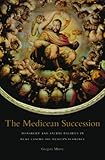The Medicean succession : monarchy and sacral politics in Duke Cosimo dei Medici's Florence / Gregory Murry.
Material type: TextSeries: I Tatti studies in Italian Renaissance historyPublisher: Cambridge, Massachusetts : Harvard University Press, [2014]Copyright date: ©2014Description: 1 online resourceContent type:
TextSeries: I Tatti studies in Italian Renaissance historyPublisher: Cambridge, Massachusetts : Harvard University Press, [2014]Copyright date: ©2014Description: 1 online resourceContent type: - 9780674416192
- 0674416198
- Cosimo I, Grand-Duke of Tuscany, 1519-1574
- Medici, House of
- Maison des Médicis
- Cosimo I, Grand-Duke of Tuscany, 1519-1574
- Medici, House of
- Florence (Italy) -- Politics and government -- 1421-1737
- Tuscany (Italy) -- Politics and government -- 1434-1737
- Florence (Italy) -- Kings and rulers -- Biography
- Tuscany (Italy) -- Kings and rulers -- Biography
- Monarchy -- Italy -- Tuscany -- History -- 16th century
- Divine right of kings
- Florence (Italie) -- Administration -- 1421-1737
- Toscane (Italie) -- Politique et gouvernement -- 1434-1737
- Droit divin des rois
- HISTORY -- Europe -- Italy
- HISTORY -- Renaissance
- Divine right of kings
- Kings and rulers
- Monarchy
- Politics and government
- Italy -- Florence
- Italy -- Tuscany
- 1421-1737
- 945/.507092 23
- DG738.17 .M87 2014eb
- online - EBSCO
| Item type | Current library | Call number | URL | Status | Notes | Barcode | |
|---|---|---|---|---|---|---|---|
 eBook
eBook
|
Biblioteca "Angelicum" Pont. Univ. S.Tommaso d'Aquino Nuvola online | online - EBSCO (Browse shelf(Opens below)) | Online access | Not for loan (Accesso limitato) | Accesso per gli utenti autorizzati / Access for authorized users | (ebsco)663485 |
Print version record.
Includes bibliographical references and index.
The familiarity of terrestrial divinity -- Divine right rule and the providential worldview -- Rescuing virtue from Machiavelli -- Prince or patrone? Cosimo as an ecclesiastical patron -- Cosimo and Savonarolan reform -- Defense of the sacred.
Main Description:In 1537, Florentine Duke Alessandro dei Medici was murdered by his cousin and would-be successor, Lorenzino dei Medici. Lorenzino's treachery forced him into exile, however, and the Florentine senate accepted a compromise candidate, seventeen-year-old Cosimo dei Medici. The senate hoped Cosimo would act as figurehead, leaving the senate to manage political affairs. But Cosimo never acted as a puppet. Instead, by the time of his death in 1574, he had stabilized ducal finances, secured his borders while doubling his territory, attracted an array of scholars and artists to his court, academy, and universities, and, most importantly, dissipated the perennially fractious politics of Florentine life. Gregory Murry argues that these triumphs were far from a foregone conclusion. Drawing on a wide variety of archival and published sources, he examines how Cosimo and his propagandists successfully crafted an image of Cosimo as a legitimate sacral monarch. Murry posits that both the propaganda and practice of sacral monarchy in Cosimo's Florence channeled preexisting local religious assumptions as a way to establish continuities with the city's republican and renaissance past. In The Medicean Succession, Murry elucidates the models of sacral monarchy that Cosimo chose to utilize as he deftly balanced his ambition with the political sensitivities arising from existing religious and secular traditions.
Access restricted to Ryerson students, faculty and staff. CaOTR


